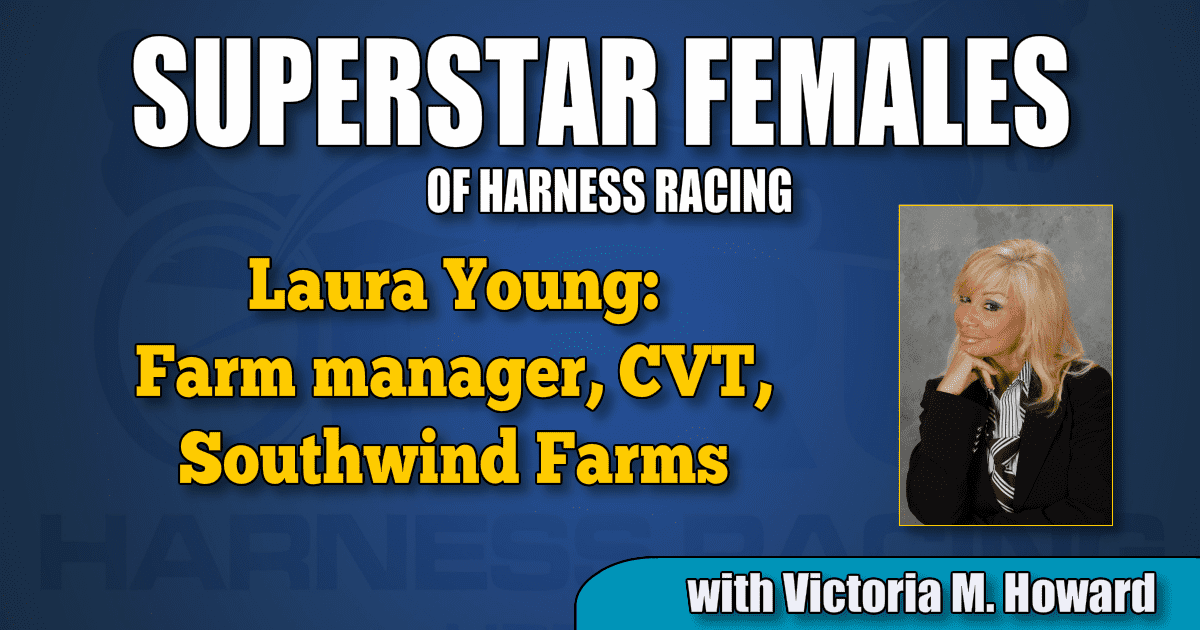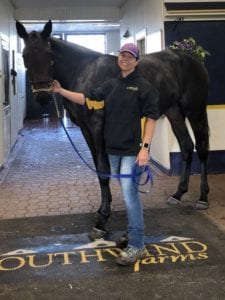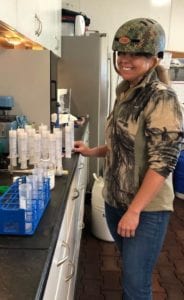Laura Young: farm manager, CVT, Southwind Farms
by Victoria M. Howard
Recently, a national poll was taken on the places where people say their dream vacation would be — #1 was Iceland, followed by Bora Bora; Santorini, Greece; Machu Picchu and The Galapagos Islands.
We all have a different opinion on what we fancy. Some like to soak up the sun on a beach in Miami while others prefer to ski the snowy slopes of Aspen, Colorado.
But if I were a horse, my Heaven on Earth would be a farm located in Pennington, NJ called Southwind Farms. It is the crème de la crème.
There, you can get R&R, be pampered at a spa and get your meals served to you in your own stall. This takes teamwork and at Southwinfd Farms there are reliable, loving, hard-working people that care about the horse. But the one person who deserves the most credit for the success of the farm is a woman named Laura Young.
Unlike many people who grew up in the business, Young did not. Young’s mother was a taxidermist and her father was a gunsmith. So how did she get started working with horses?
“I grew up in Trenton, New Jersey, in one of the toughest areas where drugs and crime were rampant. I wanted to work so I could earn enough money to get the hell out of there. I started working for Per Henriksen in 1992 as a groom. I was a 14-year-old going to high school so I could only work on weekends.
“When I was a junior I saw an ad in the Trentonian for weekend help at Southwind Farms. I went for the interview and was hired on the spot. Twenty-five plus years later and I am still here, loving every minute as if I was still that 16-year-old kid!
“At Southwind Farms the horses come first. A normal day involves checking the horses a couple times, watering and cleaning the stalls, bathing and general care. During breeding season it gets more intense as we start at 5:30 a.m. The mares are ultra-sounded for we have to see where they are in their cycles. Everything is logged and breeding decisions are made. Semen is shipped, drivers are lined up and everything is logged into the computer program.
“Afternoons are set aside for data entry, client communication, projects, yearling measurement and evaluating. Then there is evening breeding and foaling. Sometimes I never leave the barn for more than an hour in a 24 hour day!”
In her spare time, when she has some, Young is an avid hunter.
“I grew up with my parents involved in hunting/taxidermy so it is second nature to me. I know hunting is a controversial subject and I openly discuss it with the people who are against it. But when I harvest an animal my family consumes it or the meat is given to feed the hungry. We are overrun with deer in New Jersey and there are so many people starving.
“When you have a hunting, veterinarian tech/medical background it truly helps you be as realistic as possible when making crucial decisions. I also took an oath as a CVT to ease the suffering and do everything in my power to treat the animal ethically.”
Southwind Farms is the home to the 2009 Horse of the Year and 2017’s leading money-winning sire Muscle Hill. He is the proud papa to seven millionaire offsprings: Resolve, Marion Marauder, Southwind Frank, Ariana G, Mission Brief, Bar Hopping, and What The Hill. He also sired Hambletonian winner Trixton, among many others. And Muscle Hill is not only a good-looking stud, but is smart.
“Muscle Hill is by far the most intelligent horse I have ever been around. We currently stand Muscle Hill, Walner and Tactical Landing. We also manage Resolve and Sportswriter in Canada. And here at Southwind Farms we have a great broodmare band. We own 46 of our own and have a few outside mares, which brings the total available ladies up to about 55.”
In the age-old question of which has more influence, the sire or dam, Young said neither.
“I believe the environment the foals are exposed to has the most influence. You can breed the best to the best, but if that foal is not properly managed from day 1, it won’t matter who the sire or mare is,” she said.
As far as advice to people who wish to breed on their own or raise a foal themselves, Young said to be prepared to change his/her lifestyle.
“You have to be dedicated and take equine breeding or foaling courses. It can mean the difference between a healthy, live foal and a dead one. Educate yourself and have realistic expectations of what your goals are as a small start-up breeder,” Young said.



















